Cunning Little Vixen
Leoš Janáček (Music & Original Czech Libretto)
Donald Pippin (English Version of Libretto)
Pocket Opera
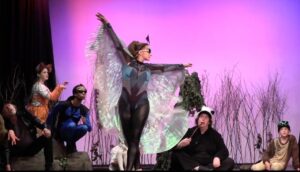 An old badger waddles outside its bushy abode, batting away a horde of buzzing, pesky insects. A spry frog hops onto a nearby rock while one by one, other forest creatures happily hop, prance, and sniff as a butterfly and blue dragon flit and fly in a dance timed perfectly to the orchestra’s melodic overture. But as a bearded forester with his long rifle ambles onto the meadow, all creature freeze; and most scurry away … all except the frog and a curious, cunning, young vixen.
An old badger waddles outside its bushy abode, batting away a horde of buzzing, pesky insects. A spry frog hops onto a nearby rock while one by one, other forest creatures happily hop, prance, and sniff as a butterfly and blue dragon flit and fly in a dance timed perfectly to the orchestra’s melodic overture. But as a bearded forester with his long rifle ambles onto the meadow, all creature freeze; and most scurry away … all except the frog and a curious, cunning, young vixen.
Such a scene is far from the normal opening of grand opera, but that norm did not deter the great and celebrated Czech master, Leoš Janáček, late in his life to take a serialized, newspaper, comic story and turn it in 1924 into an opera. His Cunning Little Vixen features a multitude of forest and farm animals along with a few humans, all of whom revel in the Moravian folk style music Janáček favored lacing into all his operas.
Years later, Pocket Opera’s founder, Donald Pippin, took Janáček’s Czech libretto and translated it into English (just as he did dozens of other operatic works); but never until now has the company brought that version to life. With a cast of twenty-two playing over three-dozen four-legged creatures; winged insects, birds, butterflies; and an assortment of humans, Pocket Opera stages a musically excellent, charmingly staged, and pleasantly entertaining Cunning Little Vixen.
The scene-interrupting Forester – tired from a night spent with a local gypsy, Terynka, instead of with his unaware wife – falls asleep in the woods only to be awakened by the leap of a frog terrified by a young fox’s desire to taste it. Seeing the eyes of the vixen reminds the Forester of those of his paramour, and he grabs her to take home as a pet for his children (possibly also as a ready reminder of his night of ecstasy).
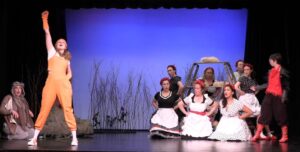
With silly scenes of farm-yard shenanigans involving rascally kids, clucking hens, and a much-maligned dog – all accompanied by an orchestra’s gloriously played music as masterfully conducted by Jonathan Khuner – one cannot help but be reminded of yesteryear’s, Saturday-morning cartoons where animals cavort anthropomorphically as classical music fills the air. To add to the unusualness of an opera unlike most, Stage Director Nicolas A. Garcia takes ample opportunity from Janáček’s original libretto to narrate mini-stories where no words are sung but much is understood through wonderfully playful mime and elegantly staged ballet.
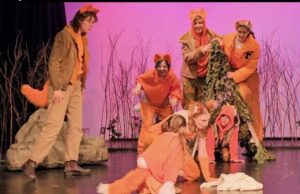
From the moment the Vixen springs onto the scene as a youngster until the moment of her tragic demise as an adult, Amy Foote embodies with wide eyes, smirks galore, and a bold spirit of devilish adventure as the fox named SharpEars. More importantly, her soprano-voiced Vixen’s lyrical, brightly toned notes sparkle to highlight her spirited foxiness. And while her Vixen can bedevil with vengeance irritating kids and can instinctly turn killer when given the opportunity for stealing a nest full of delicious eggs, SharpEars becomes flirty and truly foxy when she meets a possible mate named GoldStripe.
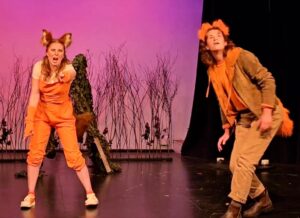
Hope Nelson comes close to stealing the show as the cocky, strutting GoldStripe whose power-packed, mezzo soprano voice electrifies this particular small stage in big-stage fashion. GoldStripe and SparpEars’ short courtship – while full of comedic touches – also plays as a beautifully sung and staged love scene, rivaling as foxes likened operatic scenes of lovers of the human sort.
Time and again, the animals rule the day in a production that is ripe for a child’s introduction to the world of opera (even with its one tragic moment not unlike what generations of children have experienced in Disney’s Bambi). With richly rounded notes that sing and howl equally well, Leandra Ramm is a lazing, stretching Dog. Puffing on a long pipe while stroking a collar of fur, Sara Couden moves with the slow stumbles of an old Badger, singing with low-toned, smoky resonance. Mary Rauh’s hooting Owl and Alicia Hurtado’s Jay hilariously sing their gossipy observations of a pregnant Vixen yet unmarried.
Alicia Hurtado also struts with cocksure brazen while singing with shrilling soprano to rule as a Rooster among a hilarious brood of clucking hens (Katherine Feller, Lilith Spivack, Natalie Harris, Phoebe Dinga and Kochavia Glaubach, Jordan McCready) with all the awkward, jerky moves expected of such a bevy of egg-layers. Many of the hens play other parts from grasshopper to woodpecker to a fox cub.
Bela Watson and Stephen Fambro time and again fly gracefully into the scene as a Butterfly/Blue Dragonfly pas de deux, their moves of ballet bringing a pause to the more comic elements of the forest scenes as the theme of love takes over. The two also become a pair of human lovers in the daydreams of a Forester as he remembers one night he never wants to forget.
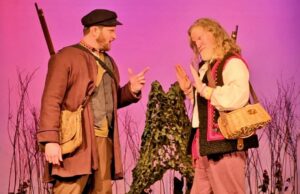
The married Forester cannot escape his longing for more time with the forbidden Terynka, with Spencer Dodd’s strong bass/baritone often pausing on vibrating notes as he complains of a “heart that is at sixes and sevens.” He is joined over steins of brew by others who pine for the woman they cannot have, including a drunken Schoolmaster who mistakes a teasing Vixon as the young woman, with Erich Buchholz bringing his piercing tenor to full bear in describing the Schoolmaster’s lovesick agony. The local Parson (a second role for Badger Sara Couden) – also prone to a bit of drink – sings his misery of a town’s gossip that he fathered a child from this same Terynka whom we never meet except in the Forester’s dreams.
As in later, similar tales told by Disney, into such a backwoods, folksy story as this there must appear a villain. A law-dodging Poacher named Harašta more than fits the bill as played in snarly, pompous fashion by Robby Stafford. His commanding, deep, bass-baritone bellows appropriately the boasts and supposed surefootedness of someone who is soon surprised to be caught in a trap meant for a sheep-raiding fox.
Much of the cuteness and humor of Pocket Opera’s Vixen comes not only from the well-directed, animal-like moves and manners of the large cast but also by the ingenuous, often comical costumes designed by Marina Polakaff. From a fully enwrapped, hopping bunny to a leather-clad, buzzing mosquito, many colors, fabrics, feathers, and human articles of clothing are employed readily to identify each of the forest and farm species. Animals and people alike find themselves in forest, farmland, and tavern settings creatively designed by Daniel Yelen with quick in-and-out movement in mind for the opera’s many scenes.
While not as awe-inspiring, emotionally impactful, or attention-captivating as many of the operas usually seen on stages both small and large, Pocket Opera’s Cunning Little Vixen offers a unique opportunity to experience a canon selection rarely seen by most audiences. It is of local interest to know that Michael Tilson Thomas’ debut in 1981 with the New York City Opera was to conduct this very opera from which its creator, Leoš Janáček, in advance chose that the final scene to be played at his funeral.
Rating: 3.5 E
Cunning Little Vixen continues 2 p.m. April 28, 2024, with one remaining performance at the Legion of Honor Museum, San Francisco. Tickets are available online at https://pocketopera.org or by phone Monday – Friday, noon – 4 p.m. at 415-972-8934.
Photo Credits: Courtesy of Pocket Opera
